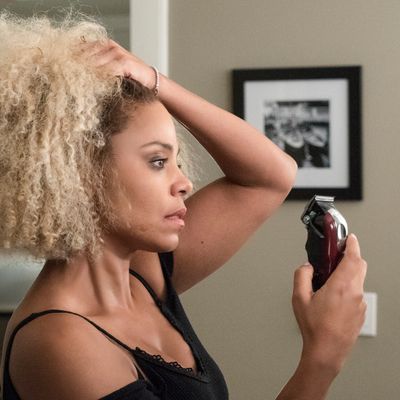
By the end of its animated credits, I understood that Netflix’s latest romantic comedy, Nappily Ever After based on a novel by Trisha R. Thomas, was trying to offer the charm of beloved 1990s black romantic comedies and dramas like The Best Man, Love Jones, and Waiting to Exhale. Directed by Haifaa al-Mansour, the film aims to be a frothy, uplifting confection, acknowledging the unique mores black women navigate and admiring their resilience. It isn’t meant to reinvent the genre or challenge viewers’ ideas — it’s cinematic comfort food. Unfortunately, instead of coming across as a warm throwback, Nappily Ever After is a romantic comedy saddled with a reductive understanding of black womanhood without enough cast chemistry or beauty to distract us.
When we first meet Violet Jones (Sanaa Lathan), a high-strung marketing exec obsessed with embodying everyone else’s idea of perfection, she’s slipping out of bed to do her makeup and have her marriage-obsessed mother (Lynn Whitfield) flat-iron her hair — all before her handsome boyfriend, Clint (Ricky Whittle), wakes up. But Violet is headed toward a breakdown even if no one else realizes it. When she gets a puppy instead of a marriage proposal from Clint (how she’s angry about getting an adorable puppy I’ll never understand), Violet unravels. She leaves Clint, shaves her head after several botched makeover attempts, rethinks her career, sparks a flirtation with a hairdresser, Will (Lyriq Bent, recently seen in Netflix’s She’s Gotta Have It), and decides to mentor his gratingly precocious daughter, Zoe (Daria Johns).
Nappily Ever After has some of the necessary ingredients for a good romantic comedy. Sanaa Lathan has the screen presence for it, as films like Something New and Love and Basketball prove. And creating a modern romantic comedy — one that blends the clashing class dynamics and physical comedy of screwball films that gave us pairs like Cary Grant and Katharine Hepburn — with a sincere interest in putting a black woman’s emotional life at the center is admirable. But by the time Violet is screaming at Will during their first encounter at his salon, after a mishap leaves chunks of her hair missing, I wasn’t sure who Violet is and if the filmmakers want us to like her in the first place.
Who really is Violet, outside of the expectations of perfection placed on her? What follows is meant to depict Violet answering that question for herself. But the film never truly digs into the character— she’s a tabula rasa meant to reflect various tangled debates amongst black women about their hair and other vulnerabilities. During their breakup scene, the critique that most riles Violet is when Clint says their two-year relationship was like one, long first date. Violet always came across as a perfectly refined check list, not a full- bodied woman. By the end, that still holds true. Nappily Ever After draws a distinct connection between hair and identity for black women. When Violet changes her hair, her personality changes as well. With a new chestnut wig, she’s a facsimile of herself; with a blunt platinum bob she tries to be a sex kitten. No new identity or hairstyle fixes the fissures within Violet’s emotional life. Fed up and drunk after a run-in with Clint, she shaves her head in the film’s standout scene. It’s meant to be a cathartic, moving turning point, but it comes across as a strange spectacle. Lathan overshoots the emotional dimension of the scene, making Violet seem crazed and manic, not triumphant. The film lacks the texture, intimacy, and warmth to communicate how hair can be art for black women, not just a pathology.
The opacity of the lead character prohibits Nappily Ever After from being a great film, but if there were some charming set-ups, it would still be a worthwhile Saturday afternoon experience. Unfortunately, Lathan shares no chemistry with her leading men. Worse yet, they are as much stock characters as she is, designed to extol talking points that drag the film into infuriating territory. Will is the worst of the two. He’s positioned as a balm to Clint’s image obsessed life — which is especially apparent once we see him interact with his parents. But Will is often condescending toward Violet, acting as if he knows the reality of a black woman better than she would know herself. At one point he compares giving black women relaxers to making him “feel like a vet putting down an animal,” a comparison that is somehow both nonsensical and insulting. He commends Violet when she makes a good point during one scene by saying “Facts!” as if he’s a Twitter thread come to life. There are many strange politics about class and the expectations of how to perform black masculinity (at one point Violet’s mother gives Clint a withering gaze, remarking at how “unusual” it is for a grown man to have a garden) that the filmmakers never fully reckon with, and that ultimately lends the film a bitterness.
Nappily Ever After could have been a light, charming film that took seriously the toxicity of perfection, the beauty of a black woman’s hair in all its forms, and a sincere consideration of a woman rewriting her own narrative. But it lacks the charm we’d expect of the films it’s indebted to and the refinement to handle the political dimension of this tale. Nappily Ever After is a love story in search of a story to tell.


